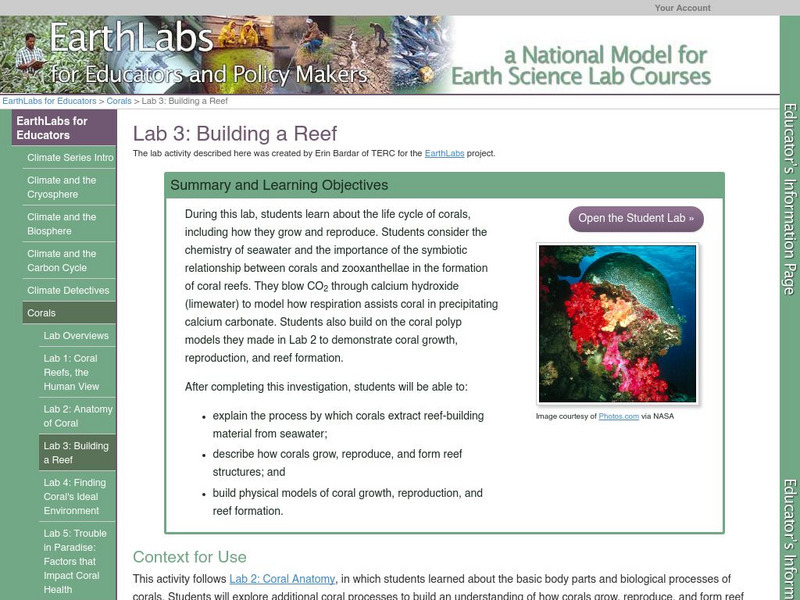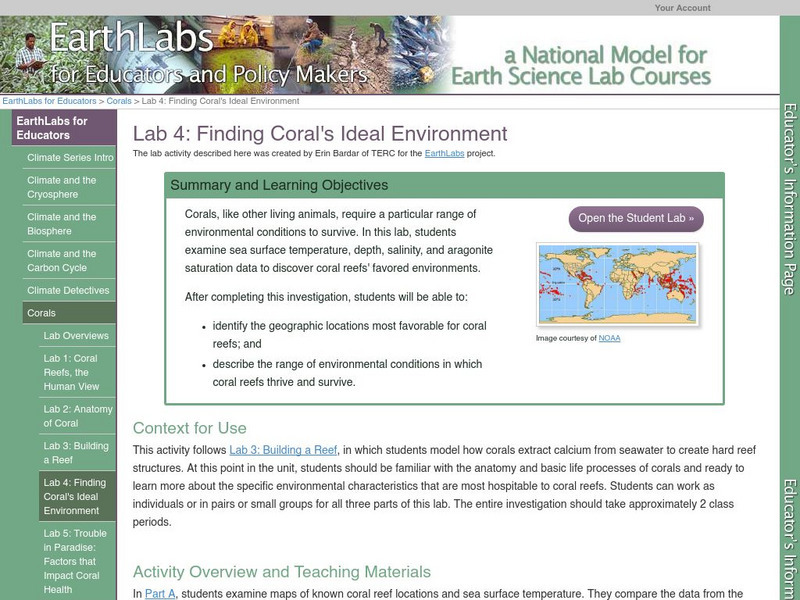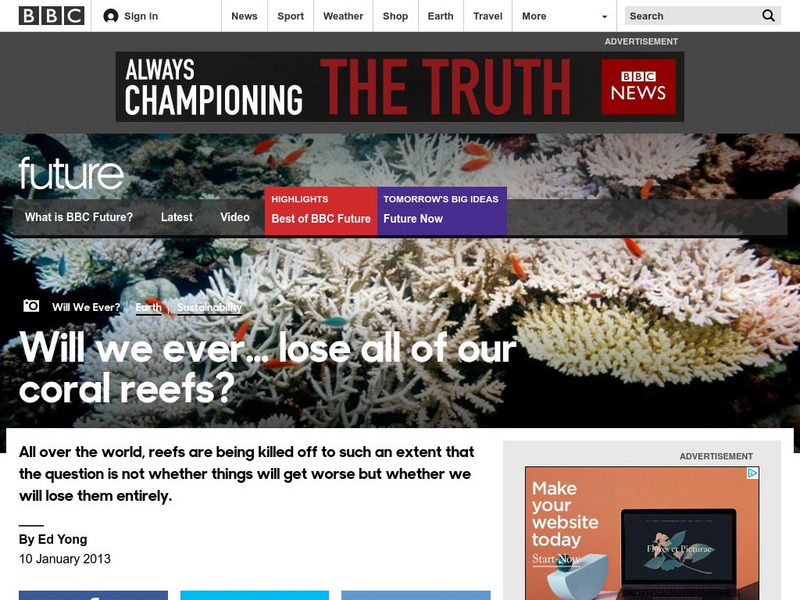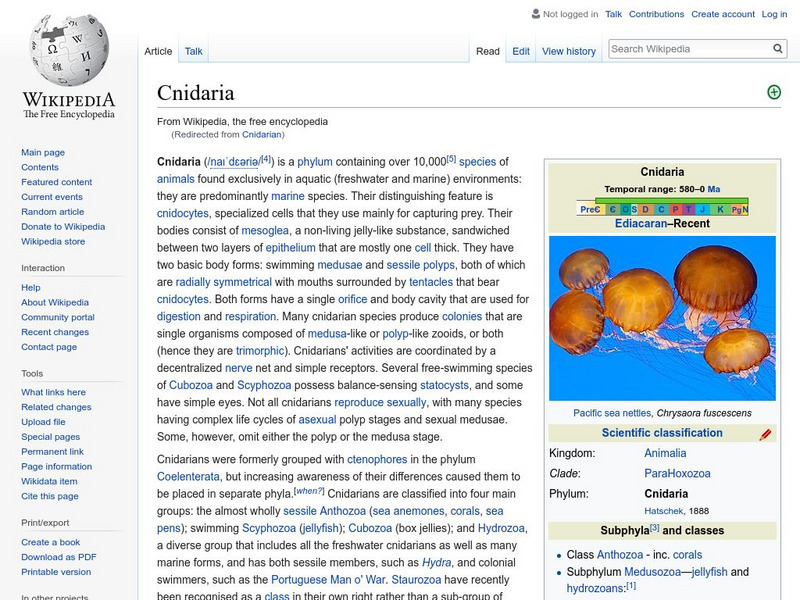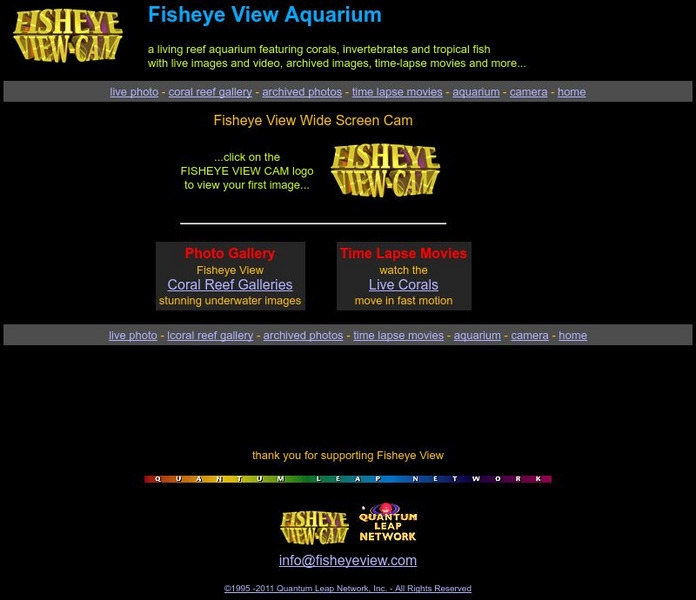Hi, what do you want to do?
Sheppard Software
Sheppard Software: Coral
This site gives an in-depth description of coral, including its behavior, appearance, and classification. The site includes photos and illustrations and an interactive quiz to test your understanding.
Smithsonian Institution
Smithsonian Learning Lab: Contrasts in Blue: Life on the Caribbean Coral Reef and the Rocky Coast of Maine
Smithsonian Education presents Contrasts in Blue: Life on the Caribbean Coral Reef and the Rocky Coast of Maine. Teachers can download this comprehensive teaching package in which learners explore two marine ecosystems, the coral reefs...
Language Guide
Language Guide: Los Animales Del Mar (Spanish)
This resource provides colorful pictures of sea animals interact with audio and the written vocabulary word as you move your mouse over the picture. This vocabulary would compliment a science unit on marine life.
US Fish and Wildlife Service
United States Coral Reef Task Force
The US Coral Reef Task Force was created to protect and sustain US coral reefs. This website provides general coral reef information as well as updates from the most recent task force meetings.
Smithsonian Institution
Smithsonian National Zoo: Zoogoer Magazine: The Marvelous Majority
This article examines a range of invertebrates. Among the invertebrates discussed included are jellyfish, coral, termites, gypsy moths, octopus, crayfish, and more.
Science Education Resource Center at Carleton College
Serc: Lab 2: Anatomy of Coral
A lab experiment in a series of experiments that investigates coral. In this activity, students will use a microscope to examine the feeding behavior of a hydra, a fresh-water relative of coral. They will also observe the characteristic...
Science Education Resource Center at Carleton College
Serc: Lab 3: Building a Reef
Students learn how corals grow and reproduce in this lab about the life cycle of corals. During this lab, students will model reef formation. This lab is part of a series of experiments that investigate coral.
Science Education Resource Center at Carleton College
Serc: Lab 4: Finding Coral's Ideal Environment
An investigation that is part of series of lab lessons where students study coral. In this particular experiment, students explore the optimal environmental conditions for coral to survive. Students will study temperature, water depth,...
Science Education Resource Center at Carleton College
Serc: Lab 6: Using Data to Identify Hot Spots and Predict Bleaching Events
A lab experiment in a series of experiments that investigates coral. In this particular lab, students look at data to study the concepts of coral bleaching, bleaching hot spots, and degree-heating weeks.
Other
Save Our Seas Organization: Home Page
Home page of the Save Our Seas Organization which seeks to protect all the oceans of the world.
Texas A&M University
Ocean World: Bringing the Ocean to the Classroom
Online resource for students and teachers to see information on icebergs, fisheries, coral reefs, waves, currents and more. Provides teachers with learning activities. Has its own ask-an-expert site (Ask Dr. Bob), and provides real-time...
BBC
Bbc Future: Week of 1 14 13: Will We Ever Lose All of Our Coral Reefs?
This article describes how climate change is impacting coral reefs around the world. Includes many photographs of coral reefs.
NOAA
Noaa: Florida Keys: Coral Reefs
This effective site provides interesting information on the third largest coral reef system in the world. Physical requirements needed for coral reefs to survive are included in this site. Growth and Reproduction, coral reef types, and...
NOAA
Noaa: Ocean Service Education: Corals
This Coral Tutorial is an excellent resource with diagrams, pictures, animations and short videos. All aspects of coral biology are discussed. As an added benefit, pdf versions of the site are available along with a subject review...
PBS
Pbs: El Nino
You can link to the anatomy of El Nino, chasing El Nino, and El Nino's reach. There is a resource page and a search page.
Center for Educational Technologies
Nasa Classroom of the Future: Coral Reefs: Dissappearing Resource
Why are the reefs disappearing? Use this site to explore the science behind the issue. Useful at several grade levels.
University of California
Ucmp: Introduction to the Cnidaria
A colorful look at Cnidarians from the University of California. Be sure to click on the 4 buttons on the bottom of the page to see all the info there is on this fascinating phyla!
University of California
Ucmp: Cnidarian Fossil Records
At this University of California, Berkeley site you can find out far back the Cnidarians show up in Fossil records. Also, find out how much they have changed over time! Be sure to click on the highlighted words to go to other interesting...
Missouri Botanical Garden
Missouri Botanical Garden: Tropical Oceans: Coral Reefs
An interesting site about coral reefs. It explores where the reefs are found, what the reefs are, animals that live in the reefs, and preservation of the reefs.
Wikimedia
Wikipedia: Cnidaria
Wikipedia offers great information on Cnidarians, a phylum of animals including coral, sea anemones, jellyfish, sea pens, sea wasps, and more.
Society for Science and the Public
Science News for Students: Motion in the Ocean
This article reports on recent research that explains why corals are in nearly constant motion. Includes a brief video. [0:16]
Other
Reef Base
This is a database on coral reefs where you can access coral reef data, take quizzes on corals, view images, get maps of reefs and more.
Other
Fisheye View Cam a Live Camera Recording Corals and O
A wonderful site with lots of pics and video feeds where you can watch real time aquariums and see fast motion coral movements.
Science Daily
Science Daily: Algal Heat Damage and Coral Bleaching
Article identifies elevated water temperature as a cause of coral bleaching due to loss of photosynthetic ability in symbiotic algae.










